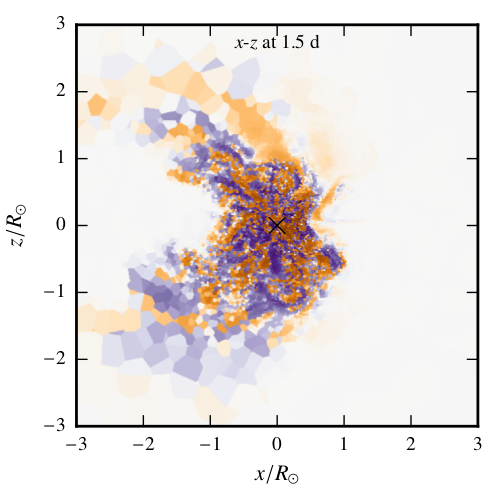First simulation of binary stars in the common envelope phase including magnetic fields

During the common envelope (CE) phase, a giant star in a binary system overflows its Roche lobe and unstable mass transfer leads to a spiral-in of the companion, resulting in a close binary system or in a merger of the stellar cores. Dynamo processes during the CE phase have been proposed as a mechanism to generate magnetic fields that are important for forming magnetic white dwarfs (MWDs) and for shaping planetary nebulae. Here, we present the first magnetohydrodynamics simulations of the dynamical spiral-in during a CE phase. We find that magnetic fields are strongly amplified in the accretion stream around the 1 solar mass companion as it spirals into the envelope of a 2 solar mass RG. This leads to field strengths of 10 to 100 kG throughout the envelope after 120 d. The magnetic field amplification is consistent with being driven by the magnetorotational instability. The field strengths reached in our simulation make the magnetic field interesting for diagnostic purposes, but they are dynamically irrelevant. They are also too small to explain the formation of the highest fields found in MWDs, but may be relevant for luminous red novae, and detecting magnetic fields in these events would support the scenario as proposed here.
Ohlmann, S. T., Röpke, F. K., Pakmor, R., Springel, V., & Müller, E. (2016):
Magnetic Field Amplification During the Common Envelope Phase,
Monthly Notices of the Royal Astronomical Society, 462, L121, [ADS]
About HITS
HITS, the Heidelberg Institute for Theoretical Studies, was established in 2010 by physicist and SAP co-founder Klaus Tschira (1940-2015) and the Klaus Tschira Foundation as a private, non-profit research institute. HITS conducts basic research in the natural, mathematical, and computer sciences. Major research directions include complex simulations across scales, making sense of data, and enabling science via computational research. Application areas range from molecular biology to astrophysics. An essential characteristic of the Institute is interdisciplinarity, implemented in numerous cross-group and cross-disciplinary projects. The base funding of HITS is provided by the Klaus Tschira Foundation.